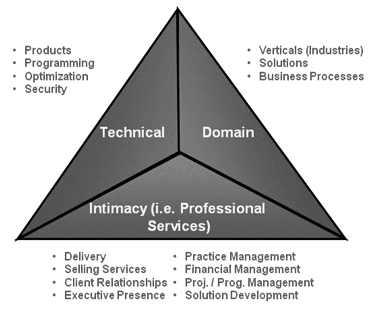Talent Development & Customer Intimacy
As I stated in my last post, talent is always important and is one of the key drivers of building and sustaining customer intimacy. Your people will constantly be generating new Ideas, then taking those Ideas to your customers and delivering on the promises made. In addition, these teams are accountable for developing intimacy at the account level. Therefore, most companies moving to an intimacy-based model make talent development one of their key initiatives because in an intimacy-based business, the skills required to sell Ideas, deliver projects, and develop intimacy are different from traditional product and service company skills.
Most of our clients have existing programs around product and technical training. Therefore, when considering talent development programs, they often ask, “Isn’t that enough?”.
That’s like playing the game of horseshoes such that close enough is still good enough to score and potentially win. So while the existing program is important and useful, it usually only covers two components of a well-crafted program.
The talent base requires a mix of skills to yield well-rounded personnel to drive success as they progress in a customer-focused model and their careers:

In general, we find companies have a very good handle on the Technical side of the equation. In addition, many people obtain their domain knowledge through their interactions with customers (i.e., the customer trains them). Where most companies, if not all, fall short is on the specific development of skills necessary for customer intimacy – those that are most closely associated with professional services skills, or “soft skills”.
In addition to integrating soft skills development, successful talent development programs also incorporate the principles of adult learning. If you are like me, you no longer absorb new, complex learnings like a sponge as we did in school by sitting and paying attention in class (and we all did that, right?). Adult learning requires more than webinars and training guides – a successful talent program includes coaching, mentoring, hands-on training, and self-improvement to fully enable your teams for success. People must be given the opportunity to:
- Participate in an intellectual forum to ask questions, share examples, and learn from others,
- Test out their new skills in a safe environment,
- Implement the new skills supported by experienced coaches, and
- Demonstrate successful adoption.
As I stated previously, most companies going to a more customer-centric model make talent of the key initiatives. Why? Customer intimacy-driven companies benefit by improving their customer’s business outcomes and, ultimately, by valuing knowledge. Developing talent benefits your company by accelerating learning of skills and abilities within the organization. It benefits your teams by making their work experience a positive one and by helping them reach their full potential.
Remember, in an intimacy-based business, the individual’s success is the company’s success. The company that provides the framework to develop its employees is the one that wins in the marketplace. Furthermore, while the company provides the framework to develop your employees, it is still a shared responsibility as the individual must take the initiative to ensure his/her success.
Written by: Mark Slotnik
About the Author: Mark Slotnik has spent nearly 20+ years advising clients in the areas of designing and taking to market high-value business solutions, solution portfolio management, talent development, resource management, business process re-engineering and commercial software.
